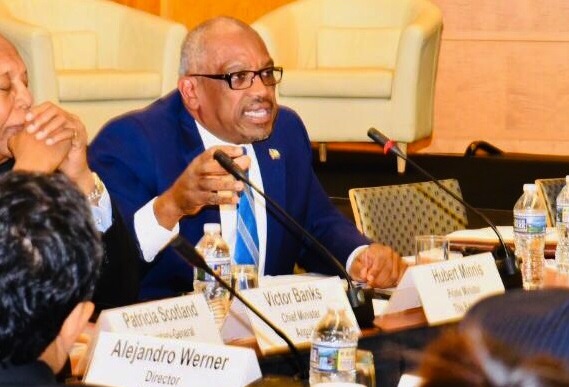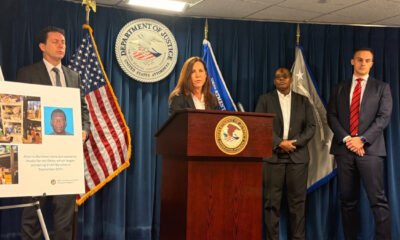#Nassau, November 28, 2018 – Bahamas – Intervening on behalf of The Bahamas at an international conference on “Building Resilience to Disasters and Climate change in the Caribbean,” Prime Minister, Dr. the Most Hon. Hubert A. Minnis called on the donor community to play a key role in the development of catastrophe insurance solutions for developing countries.
 “Like many other Caribbean countries, disasters in The Bahamas can have a large, direct impact on economic conditions through reduced productivity and increased national debt due to reconstruction costs,” the Prime Minister said as he addressed the Inter-American Development Bank/International Monetary Fund/World Bank Conference at the IMF Headquarters in Washington, D.C on Monday, November 26, 2018.
“Like many other Caribbean countries, disasters in The Bahamas can have a large, direct impact on economic conditions through reduced productivity and increased national debt due to reconstruction costs,” the Prime Minister said as he addressed the Inter-American Development Bank/International Monetary Fund/World Bank Conference at the IMF Headquarters in Washington, D.C on Monday, November 26, 2018.
The Prime Minister led a Bahamian delegation to the high level conference which brought together other leaders of the Caribbean Community (CARICOM), key stakeholders, including senior policymakers, public, private, and multilateral development partners, to explore incentives to shift the focus of policies towards building resilience and innovative disaster risk financing policies and instruments that would help in this regard.
The Prime Minister said as a result of Hurricane Matthew in 2017, The Bahamas Government initially borrowed $150 million and made allocations for capital works, and transfers and subsidies for relief and reconstruction. He further explained that this widened the fiscal deficit from an estimated 1.0 per cent of GDP in 2016/17 before Hurricane Matthew to 1.9 per cent of GDP after Matthew. This represented an $81 million increase in the deficit after the hurricane.
“Subsequently, we recognized that in post-disaster relief and recovery, we should have the resources and means at our disposal to finance our direct contingent liabilities more efficiently, and to be better able to provide additional aid to small businesses and low-income farmers, who are disproportionally impacted by disasters,” he said.
Specifically addressing the topic “Improving Risk Transfer” the Prime Minister noted that as the frequency and severity of disasters increase due to climate change, the intensified shocks could create debt burdens on future generations, and erode development progress.
“We also need to promote insurance solutions for homeowners. The possibilities of introducing natural disaster insurance for homeowners are as varied as the disaster management strategies of different countries,” he said.
According to the Prime Minister, there is no single ideal or universally applicable solution for homeowner’s disaster insurance. In this vein, he said that each country must find and adapt a model that best fits its exposures, existing insurance market infrastructure, institutional set-up and political acceptability.
“However, pooling of risks at the regional level may be the solution to overcome any shortcoming in any particular country.”
The Prime Minister also spoke of the challenge that policymakers often have, which is difficulty obtaining political and economic commitment due to other competing needs and priorities.
“While many agree that reducing disaster risk is important for saving lives and property, few countries such as The  Bahamas have appropriate measures in place because other policy issues require greater attention and funding,” he said.
Bahamas have appropriate measures in place because other policy issues require greater attention and funding,” he said.
The Prime Minister also observed that policymakers are in need of clear evidence, including cost-benefit analysis, to convince the public and various stakeholders that a commitment to risk transfer is as practical and necessary as any other priority.
And, he called on the donor community to “play key complementary roles in the development of catastrophe insurance solutions for developing countries.”
These roles, he stated, include helping to subsidize insurance premium in the context of a country putting together a sound macro-fiscal framework, and increasing the capitalization of the Caribbean Catastrophe Risk Insurance Facility, so that insurance premium come down automatically.
“In terms of convening power, the World Bank and other IFIs can play a catalytic role in the development of efficient partnerships among countries, donors, and private markets for the financing of catastrophic risks,” the Prime Minister said.
By Lindsay Thompson
Release: BIS
Photo Caption: Prime Minister Minnis making intervention at the climate change summit, November 26, 2018, IMF Headquarters, Washington, DC.
(BIS Photo/Yontalay Bowe)




 Bahamas News1 week ago
Bahamas News1 week ago
 TCI News1 week ago
TCI News1 week ago
 TCI News1 week ago
TCI News1 week ago
 TCI News1 week ago
TCI News1 week ago
 Bahamas News1 week ago
Bahamas News1 week ago
 USA4 days ago
USA4 days ago
 Bahamas News1 week ago
Bahamas News1 week ago
 Bahamas News1 week ago
Bahamas News1 week ago














